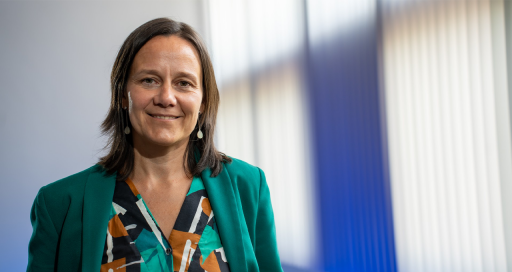Recently a finalist in the European Prize for Women Innovators 2025, Dr Fanny Bardé is determined to revolutionise electrical batteries. Her entrepreneurial research startup, SOLiTHOR, is working on a safer and better-performing solid-electrolyte technology to meet the mobility challenges of tomorrow.

©ioha
The name SOLiTHOR is a portmanteau of solid, lithium, and Thor – the god of thunder. It encapsulates the objective of this startup, created in 2021 by Fanny Bardé and her associate Huw Hampson-Jones: to develop the battery of the future. This is a “solid-electrolyte battery made from composite hybrid material, which solves the safety problems of conventional batteries and improves on their performance,” says Fanny Bardé. “Compared to conventional batteries available on the market today, solid-state batteries are lighter,smaller, and significantly safer—especially when it comes to fire risk.They open up a range of possibilities beyond the electric car, in the realms of sea, air and even space travel, with real benefits in terms of decarbonisation..”
For the Chief Technology Officer of SOLiTHOR, this ambitious project was born at imec, the interuniversity microelectronics centre based in Leuven, Belgium. But long before that, two pivotal meetings led her to devote herself entirely to the study, research and development of electric batteries.
The first occurred when she was a young chemistry student at the University of Picardy Jules Verne in Amiens, in northern France. “I found nature intriguing from an early age, so I was naturally attracted to chemistry. At university in Amiens, I was lucky enough to meet an exceptional professor, Jean‑Marie Tarascon, now teaching at the Collège de France, who came from a background in the energy storage industry in the United States. I worked on batteries in his lab, and he was my thesis supervisor for three years,” recalls Fanny Bardé. “I entered applied research on an equal footing, which suited me perfectly, having always wanted my work to have an impact on everyday life”.
From academia to industry
Her second mentor was Maria Rosa Palacin Peiró, a specialist in the application of solid-state chemistry and electrochemistry to batteries, and a professor at the Barcelona Institute of Materials Science (ICMAB), where, when not working in Amiens, Grenoble and Slovenia, Fanny Bardé completed part of her doctorate in the early 2000s.
“In an extremely fast-changing world, you have to remain focused on your objectives while maintaining a good balance between the short and long term.”
“Rosa Palacin was an inspiration to me, showing me it was possible as a woman to become a high-level researcher,” says Fanny Bardé. Recently a finalist in the European Prize for Women Innovators 2025, the scientist, who leads a 40% female R&D team, is in turn working to pass the baton to young female researchers by visiting universities to talk about her experiences.
And this French, English, Flemish and Spanish-speaking polyglot certainly boasts an inspirational career path. Under her post-doctoral contract, Fanny Bardé worked in the United States for the Duracell research centre in Needham, Massachusetts, focusing on the development of new materials for hearing-aid batteries. There, she filed her first patent. “I learned a lot about transferring technologies from the academic world to the industrial sector.”
In 2004, she signed her first permanent contract with Toyota. “At the time, with the Prius, they were one of the rare carmakers developing a hybrid electric vehicle. My very specific profile was exactly what they were looking for.” She soon found herself in the R&D department at Toyota’s European headquarters in Brussels, where over 15 years, she occupied every post from engineer to technical manager. “I worked with all the world’s greatest battery specialists. But I also discovered the world of industrial manufacturing and the challenges of mass production, quality control and standardisation. That experience afforded me direct contact with end users and their expectations.”
Staying agile and anticipating
In 2019, Fanny Bardé felt the need to explore this link between research and industry from a different angle, via imec, which specialises in technology transfer and its successful application in industry. It was there in Leuven, Belgium, that she would spend three years developing solid-state batteries, mostly as part of a consortium of a dozen partners supported by the European Union. “I then had the opportunity to create a spinoff via the imec incubator and launched SOLiTHOR with my associate, the former CEO of a UK battery company, who taught me a great deal about entrepreneurship.”
Since their startup launched in September 2021, the team, which now comprises 34 people based in the Belgian town ofSint-Truiden, north of Liège, has made enormous strides and is now preparing its second round of fundraising. “Three to five years from now, we should be seeing the first actual industrial applications, no doubt for drones or robots,” suggests Fanny Bardé, who however has no intention of building a gigafactory: “Our business model will be based on licensing.”
Fanny Bardé’s watchword is agility: “In an extremely fast-changing world, you must be able to anticipate and have the ability to manage unforeseen situations while remaining focused on your objectives and maintaining a good balance between the short and long term.” As a half-marathon runner, Fanny Bardé knows a thing or two about consistency and perseverance.
07/15/2025